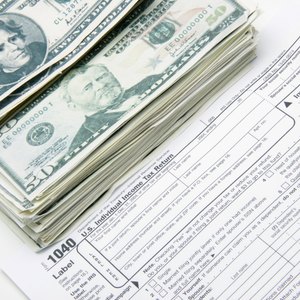
If you have income that doesn't automatically have sufficient taxes withheld from it, like self-employment or investment income, you might have to make quarterly estimated tax payments. If you forget to make a payment, it's not the end of the world, but you'll often owe a little extra on your taxes because of it.
Underpayment Penalties
When you don't pay what you owe on time, the IRS imposes underpayment interest. For example, if you should have made a $1,000 estimated tax payment on June 15, 2013, but you forgot and didn't make the payment until July 15, 2013, you would owe the IRS interest on that $1,000 for the month it was late. The interest rate varies over time, depending on the current market interest rates.
Safe Harbors
There are two circumstances in which your failure to pay estimated taxes won't hurt you on your taxes. First, if your other withholding satisfies at least 90 percent of your tax bill for the current year, or your tax bill is less than $1,000 to begin with, you're safe. The second safe harbor uses your prior year's tax bill. If your prior year's AGI was under $150,000 -- or $75,000 if you're married filing separately -- you're good with the IRS if your withholding equals at least the amount you owed in taxes last year. If your AGI is higher, your withholding needs to be at least 110 percent of what you paid last year in order to avoid any extra payments.
Waivers
Even if you don't qualify for a safe harbor, the IRS still has the power to waive the penalty in certain circumstances. If you couldn't make your estimated tax payments because of a natural disaster, casualty or other circumstance that would make it flat-out unfair to charge you the penalty, the IRS may offer forgiveness. You can also seek absolution for your forgetfulness if you retired during the year after turning 62 or suffered a disability and your mistake was for a reasonable cause, not intentional neglect. For example, if a tornado strikes your home just days before the payment is due and you can't get to your checkbook or use the Internet to make a payment, the IRS could waive the penalties.
Tax Filing
When you file your taxes, you can calculate the interest you owe with either Form 2210 or Form 2210-F. Whatever the interest is, it just gets added to your taxes due and either increases the amount you owe or decreases your tax refund. Alternatively, if you're uncomfortable with the math, you can just alert the IRS that you think you owe interest and the IRS will calculate the penalty and send you the bill.
References
Writer Bio
Based in the Kansas City area, Mike specializes in personal finance and business topics. He has been writing since 2009 and has been published by "Quicken," "TurboTax," and "The Motley Fool."

